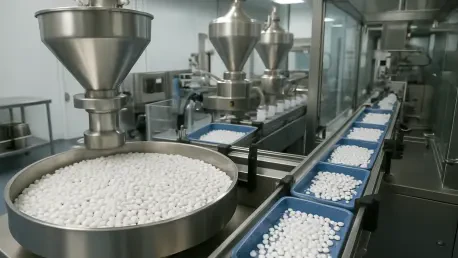The recent wave of investments by major biotech companies into U.S. manufacturing capabilities marks a pivotal movement, reshaping the landscape of the pharmaceutical industry. These corporations are strategically enhancing domestic production to mitigate risks associated with global supply chains and ensure consistent delivery of critical medicines. Biogen Inc., for instance, has committed $2 billion to extend its manufacturing footprint in North Carolina’s Research Triangle Park. This investment aligns with Biogen’s robust history of supporting U.S.-based operations. The expansion aims to advance its drug manufacturing prowess, focusing on antisense oligonucleotide development and cutting-edge automation, ultimately ensuring reliable patient supplies and innovating production techniques.
The trend of bolstering U.S. manufacturing isn’t isolated to Biogen. It dovetails with national directives, such as past executive orders aimed at strengthening domestic prescription drug production. The goal is to bolster national security and maintain supply chain integrity amid fluctuating international tariffs and shipping challenges. The biotech sector, often characterized by rapid innovation and evolving regulatory demands, finds itself at a crossroads where concentrated domestic investments could unlock new efficiencies and technological breakthroughs. As companies like Eli Lilly, Thermo Fisher Scientific, and others join this national movement, the narrative of a fortified and resilient U.S. biotechnology manufacturing agenda becomes unmistakably prominent.
Strategic Moves by Industry Leaders
Several prominent pharmaceutical companies are participating in this trend, emphasizing a shift toward robust domestic production infrastructures. By committing significant funds and resources toward U.S. site expansion, these corporations are not just responding to logistical concerns but also future-proofing their operations. Eli Lilly, Thermo Fisher Scientific, and Becton, Dickinson, and Company have each announced substantial investments aimed at enhancing their U.S. production capabilities. These initiatives not only address immediate concerns but also strategize long-term growth, harnessing innovations in manufacturing processes to remain competitive globally. In a landscape where speed and reliability can be as critical as clinical efficacy, having state-of-the-art facilities close to key markets provides these giants with a distinct advantage.
Moreover, the shared focus on enhancing infrastructure aligns with larger industry efforts toward sustainability and efficient production methods. By investing in advanced technologies such as automation and AI-driven processes, these companies are setting new standards in manufacturing excellence. Regeneron Pharmaceuticals, in particular, exemplifies this approach by expanding capacity through strategic collaborations, ensuring scalable and flexible manufacturing solutions. Furthermore, companies like Novartis, Johnson & Johnson, Roche Holdings, Bristol-Myers Squibb, and Sanofi are actively channeling investments to bolster both R&D and manufacturing in the U.S., signaling a collective commitment to future-proofing the biopharmaceutical landscape. This alignment of strategy and aspiration is reshaping the industry’s approach to manufacturing, emphasizing resilience and ingenuity.
Implications for the Biopharmaceutical Landscape
The strategic re-shoring of pharmaceutical manufacturing has broader implications for the biopharmaceutical industry. It highlights a deliberate response to the vulnerabilities exposed by international supply chain disruptions and the need for geographical diversification. Reinforcing domestic production capacity not only addresses these immediate concerns but also reflects an anticipation of future challenges where constricted supply lines or heightened regulatory environments could create hurdles. This shift emphasizes resilience and rational allocation of resources, propelling U.S. manufacturing into the spotlight as a key component in global pharmaceutical strategy. The influx of financial investment indicates an overarching theme of self-sufficiency and aligns well with consumer expectations for quicker access to crucial medications.
Furthermore, the evolving manufacturing environment in the U.S. sets the stage for significant technological advancement, as automation and AI are integrated into manufacturing processes. The convergence of technological prowess with traditional production paradigms opens new pathways for innovation, driving efficiency and reducing costs significantly. With companies prioritizing these advances, the industry is likely to see a profound transformation in how drugs are developed, manufactured, and delivered to patients. This increased focus on in-country production also serves as a catalyst for job creation and economic growth, benefiting local communities and reinforcing the strategic importance of biotech clusters like North Carolina’s Research Triangle Park. Ultimately, this dynamic evolution reflects a calculated approach toward sustaining both business viability and public health imperatives.
The Future of U.S. Drug Manufacturing
A significant shift is occurring within the pharmaceutical industry due to substantial investments in U.S. manufacturing by leading biotech companies. These organizations are strategically boosting their domestic production, aiming to counterbalance the risks linked to global supply chains and maintain a steady supply of essential medications. For instance, Biogen Inc. is dedicating $2 billion to expand its manufacturing presence in North Carolina’s Research Triangle Park. This initiative aligns with Biogen’s longstanding commitment to U.S.-based operations, targeting the enhancement of drug production capabilities, especially in antisense oligonucleotide development and advanced automation, to secure reliable patient supplies and innovate manufacturing processes. This trend is not unique to Biogen; it fits into broader national strategies, including executive orders designed to strengthen domestic drug production, thereby enhancing national security and supply chain resilience against international tariff and shipping issues. Companies like Eli Lilly and Thermo Fisher Scientific also contribute to this robust national movement, underscoring the growing emphasis on a resilient U.S. biotechnology manufacturing sector.









